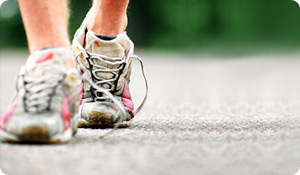
The symptoms are frequent loose bowel movements during or immediately after a run or other extreme exercise event. Sometimes an attack of "the runs" is so intense and comes on so fast that runners' have a hard time making it to the bathroom.
What Causes Runner's Diarrhea?
Doctors and scientists who specialize in sports medicine and gastroenterology aren't exactly sure what causes runner's diarrhea, but evidence does point to a couple of causes.
The intestines are filled with blood vessels that supply oxygen-rich blood and transport water and nutrients to the rest of the body. When athletes are exercising hard for long periods of time, their heart, lungs, arms, and legs need the body's blood supply more than the intestines do, so blood flow is diverted away from the gut and toward the extremities and vital organs.
At the same time, water is being absorbed from the intestines to keep the rest of the body hydrated and cool during heavy exercise. This may cause the runner to become dehydrated.
When you put these two factors together, decreased blood flow plus dehydration, the intestines evacuate their contents to minimize intestinal irritation. The result is diarrhea.
Some scientists speculate that intense exercise might also trigger a hormonal response from the nervous system that affects the intestinal lining. This might be another cause for runner's diarrhea.
Can Runner's Diarrhea Be Prevented?
Many runners say that avoiding certain foods and timing pre-run meals correctly helps them stay away from the bathroom during exercise.
- Avoid high-fiber and gas-producing foods the day before your athletic event.
- Avoid foods containing artificial sweeteners, a frequent source of intestinal irritation.
- Decrease or avoid caffeine.
- Don't consume high-energy foods, drinks, or bars.
- Run on an empty stomach or eat only very lightly before a run.
- Time your run to occur after you normally have a bowel movement.
- Drink plenty of fluids before, during, and after your run.
If all else fails, talk to your doctor about whether taking an antidiarrheal medication is a good idea for you.
Sources:
Medline Plus
National Institutes of Health
http://www.nlm.nih.gov/medlineplus/diarrhea.html





